QuestionQUESTION: I was adopted by a local neighbor hood stray cat,She adopted me I didnt adopt her! LOL Anyways when she first came to me I could notice that she belly was big and her nipples were large I knew that she was pregnant. after a week of feeding here outside she decided one day that see wasnt leaving and that was unlike her. she normaly wanted her food about an hrs worth of petting and then go on the prawl the rest of the night. Well now shes been inside for over a week shes seems to be laying around alot and today she really hasnt eaten much. I can feel the kittens moving around in her like crazy today and she seems to have a little change in her mood.
How long before I can expect to see baby kittens?
ANSWER: Tim,
Unless you actually witness the mating there's no way to know for sure without having a vet do an ultrasound or take x-rays and give an educated guess as to the gestational age of the kittens. The gestation period for cats is between 60-68 days with 63 days being average. From your description it sounds like the behaviors you're seeing might mean that mom's gearing up to have her babies within the next while, but I'd only be guessing if I gave you an actual figure because I haven't seen her and I'm going on your description of her physical appearance and behavior.
I would suggest that you prepare a bed for mom to have her kittens in - a large cardboard box with low enough sides to allow mom to come and go with ease but high enough sides to prevent newborn escapes is great, line it with old towels or blankets, partially to absorb the fluid during labor and partly to help keep the kittens warm. You may find that putting several layers of newspaper under the towels makes things more absorbent. Any bedding that becomes wet or soiled should be changed immediately to prevent the kittens from getting sick or wet and cold. It's not a bad idea to have mom in a quiet, dimly lit room with her nursery box during the night, many litters are born during the night and you probably don't want her to have the kittens on carpet, upholstery, beds, bedding or laundry because the blood and fluids normally present during birth can cause stains that are difficult to remove. Be sure that mom's litter, food, water and cozy places are available in her night time accommodations.
There are a number of opinions about how old kittens should be when they leave their mother and move into adoptive homes. I've cared for many kittens over the years and in my experience kittens who stay with their mother for the first 12 weeks are less likely to have certain health and behavioral issues. It really is best if mom cares for her kittens til they're at least 12 weeks old, at that time they're less fragile, they've been eating solids for awhile, they won't usually suffer from low blood sugar (can happen quite suddenly in kittens 9 weeks old or younger and it can be fatal if not discovered in time) and by the age of twelve weeks kittens have learned some basic etiquette in terms of how they socialize with other cats and their human caregivers.
Although young kittens are cute it's important that you play the role of helping socialize them with people so that they behave appropriately and have a better chance of living in a permanent home. Never allow any kitten, no matter how adorable to chew any of your possessions, never ever permit a kitten to bite, scratch or attack any part of your body - this includes hands, feet, fingers and toes under the blankets at night. Kittens should be taught that they can play with mom, their siblings and toys. If kittens think that biting or scratching is a game it can cause their adoptive family to euthanize, abandon or admit their cat to a shelter because they're worried that their cat may hurt someone. In North America the leading cause of death in cats is euthanasia due to behavioral problems, some problems are completely preventable by properly socializing cats when they're tiny kittens, others are prevented or reduced in intensity by spaying/neutering kittens as early as possible.
Newborn kittens have very little resistance to infection so it's important to keep mom and her babies away from any other pets and be sure that anyone who handles this little family takes time to thoroughly wash their hands in hot, soapy water to reduce the likelihood of passing along some sort of infection. The first 12 weeks of a kitten's life are when they're growing most rapidly and they also learn important skills including how to defend themselves, how to stalk, pounce on and kill prey, how to interpret feline body language and respond appropriately. The first 12 weeks of a kitten's life also include milestones such as potty training, eating solid food and learning skills like bite inhibition and not using their sharp claws/teeth on any part of any person's body which are important parts of their socialization and will help to ensure that these baby predators are as adoptable as possible. It's a good idea to provide mom and her kittens with sturdy scratch posts and cardboard scratch pads, that way kittens learn to use these tools early and they aren't as likely to be declawed.
Unlike dogs nursing queens don't require any human help to wean their kittens, this normally happens some time in the first 12 weeks of a kitten's life. I would recommend providing mom and her newborn family with a comfy bed made from a cardboard box lined with old towels or a blanket, the box should be large enough for mom and her babies to stretch out and nurse comfortably, have low enough sides that mom can come and go easily and have high enough sides to prevent the tiny newborns from wandering off on their own. I recommend against ever allowing mom and her newborn kittens sleeping in bed with any person because kittens are easily suffocated if we accidentally roll onto them.
Mom should have access to as much fresh water as she likes, she should also have as much of a high quality, holistic cat food made from human grade ingredients as she wants. I've found that Wellness and Spot's Stew by Halo are good quality foods and they're made from human grade ingredients. Wellness is meant to be fed as a combination of canned and dry food which can be a bit pricey. I feed my cats Spot's Stew Sensitive Cat by Halo, a 6 lb bag costs roughly $25 and lasts my 3 resident cats about a month. You can choose to feed canned food, dry food or any combination you like. Mom's food intake can double, triple or even quadruple in some cases while nursing kittens because she has to meet her own nutritional needs as well as those of her rapidly growing family. High quality foods may initially appear expensive when compared to brands sold in grocery/discount stores. When cats are fed a high quality food they tend to eat less because they don't need as much food to meet their nutritional needs. Litter box deposits are less frequent and less pungent. Cats who are fed high quality foods have fewer health problems which means that you spend less money at the vet's office. Another advantage to high quality nutrition for your cat is that she'll likely live a much longer, healthier life.
Kittens learn about things like litter training, using scratch posts and how to interact politely with people from their mother.
When the kittens start being more mobile (2-3 weeks of age) it's a good idea to make kitten sized litter pans available - a cheap, easy and disposable solution is to use aluminum pans with low sides from the grocery store, the ones meant for baking are best, the lower the sides are the sooner the kittens will begin to explore their litter pans. I would recommend that you use a non toxic kitty litter such as one made from wheat or corn to ensure that the kittens won't become sick if they eat the litter and many do, at least initially. As the kittens see mom using a litter pan they will eventually copy her in most cases. Sometimes it's easiest to gently get the little ones using their paws to scratch and dig in the litter and then you or mom can gently stimulate them to urinate/defecate by using a cotton ball lightly moistened with warm water to gently wipe the kitten from genitals to bottom which will help reduce the likelihood that the little one will develop a urinary tract infection. Once the kittens are able to smell urine/feces in the temporary kitten litter pans they will begin to use the litter rather than squatting where they happen to be at the time the urge to go to the toilet hits them.
There is an incredibly serious pet overpopulation issue that affect shelters and rescue organizations. Unfortunately many animal loving staff working for animal welfare organizations are forced to euthanize healthy, adoptable animals simply because they don't have the time, space or resources to devote to each animal until their forever family comes along to adopt them. The euthanasia rate for cats tends to be much higher than that of dogs, possibly because cats are seen as disposable or simply because pet parents aren't taking the simply step of controlling pet overpopulation by spaying/neutering their cats. It's important to keep the new mom indoors and away from intact male cats because she can become pregnant as early as 24-48 hours after giving birth. I would also recommend that you discuss spaying/neutering with anyone who wants to adopt one or more of these kittens, it's important that potential adoptive parents be prepared to accept the responsibility of providing their kitten(s) with appropriate care and spaying/neutering is definitely a part of ethical pet parenthood.
There are many good behavioral and medical reasons to spay/neuter our cats. Cats that have been spayed/neutered are prevented from getting uterine, ovarian or prostate cancers. The earlier in life that a cat is spayed/neutered the less likely s/he will be to develop prostate or breast cancers. Unspayed female cats are at risk of developing a potentially life threatening uterine infection called pyometra which causes the womb to fill with pus, if the uterus ruptures and spreads infection throughout the abdomen the cat's chances of survival are pretty low. The only treatment for pyometra is to perform an emergency spay, this procedure is much riskier than a routine spay because the cat is already quite sick which is associated with higher risks of anesthetic death and post surgical complications. The emergency spay is more complicated and time consuming so it tends to be quite a bit more expensive than a routine spay.
The leading cause of death in cats living in North America is euthanasia secondary to behavioral issues. This statistic is heart breaking because many behavioral issues can be prevented or minimized by spaying/neutering our cats. Common behavioral problems including inappropriate elimination (urinating or defecating outside of the litter box), fighting with other cats (the resulting injuries from cat fights often require medical care because bite wounds tend to get badly infected forming abscesses which must be drained under anesthetic, flushed with sterile saline and treated with antibiotics), queens howling to advertise their availability to mate, tom cats caterwauling and fighting to win the right to mate with receptive queens and wandering over a large area are all issues which can be prevented by having the cat spayed/neutered before they reach sexual maturity. Behaviors like house soiling or fighting can sometimes occur with cats that have been spayed/neutered however these behaviors are often related to things like improper introductions to new cats in the household, poor litter box hygiene, scented litter, and other issues which can be easily solved.
Ultimately spaying and neutering our cats is a responsible and ethical choice which saves countless lives each year. For pet parents that are having difficulty getting the money together for routine vet care I may be able to help find a solution to those issues. I keep an ever growing list of resources that may be willing to cover part or all of the cost of routine care like kitten vaccines and spay/neuter procedures. The only information that I ask for in these cases is that the pet parent provide the general area they are writing from - in Canada or the US the province or state is fine. Spaying and neutering helps cats to live longer, healthier lives and as kitty caregivers that love our pets we all want to have as much quality time as possible with our furry friends.
---------- FOLLOW-UP ----------
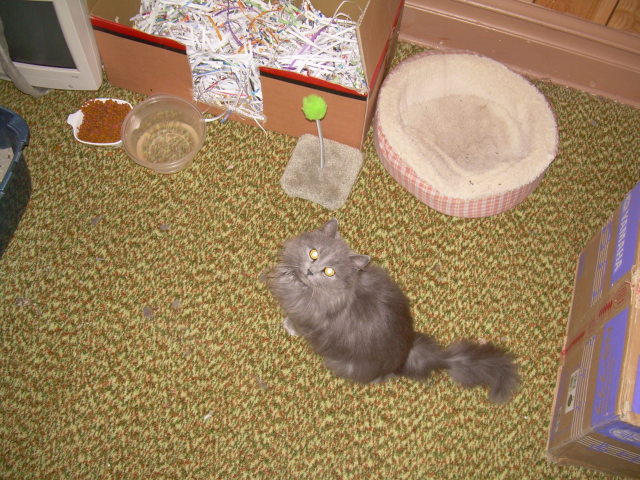 Soon to be new mom
Soon to be new mom
QUESTION: I just wanted to tell you that I took her into the vet today they told me that I should be looking forward to kitten really soon. I have also named her now her name is now Missy. She is now one more cat off the streets and has a good home with people that wil love her. After she has this litter of kittens she is going into the vet to get spayed.
ANSWER: Tim,
Congratulations on your new companion, Missy's absolutely stunning and she looks like a real sweetheart. I'm glad to hear that you're going to provide Missy with a permanent home, find permanent adoptive homes with responsible pet parents to care for Missy's babies when they're ready to go and it's wonderful to hear that Missy will be spayed as soon as possible.
---------- FOLLOW-UP ----------
QUESTION: Its been about a month now and still no kittens! Missy is starting to look like a bowling ball. I cant even get both my hands around her shes that big. I can feel the kittens moving around inside her belly like crazy,they scratch and kick at it. I'm just looking forward to haven kittens around to play with so bad. I come in her room first thing every morning,I come home on my lunch brakes and check,heck the first thing I do when I get home from work is go and check on her to see if theres any kittens.
AnswerTim,
I understand that you're super excited about the arrival of Missy's kittens, I wish I could tell you for sure when she's going to give birth, but I can't. If you want to know more conclusively when the babies are due your vet can perform an ultrasound or x-ray to determine the approximate gestational age of the kittens and roughly when Missy's expected to have her kittens. Depending on what your vet's comfortable with it's possible to have him/her perform a vaginal exam which can also provide information about how far along Missy is into her pregnancy. If Missy's relatively close to delivering her babies a vaginal exam can reveal whether or not her cervix has started to show signs of labor such as softening or starting to dilate in preparation for the birth. Provided that your vet feels that Missy's healthy and her kittens are doing well there's no reason to rush things, the kittens will come in their own time when nature says they're ready.
If you want to minimize Missy's stress and avoid another trip to the vet unless there are signs that something's wrong the only thing you can do is to wait patiently for the kittens to come. It's not uncommon for queens to deliver their babies sometime during the night without people in the household being aware that the time has come. I've fostered my share of pregnant queens and been surprised when I woke up in the morning to find that the kittens were born during the night. A marked decrease in appetite and activity levels for a day or two before Missy gives birth wouldn't be unusual. Missy may also pace, pant and look for an appropriate place to have her kittens. You might notice Missy checking out closets, underneath furniture or in cramped corners. That's not unusual, mother cats like to give birth in small, dimly lit places that aren't easily accessible to humans or other animals.
It's obvious to me that you're really looking forward to the day you get to meet Missy's babies. I'm glad that she's got someone like you to care for her. I wanted to pass along some information to help you provide Missy and her kittens with the best environment possible during the final stretch in her pregnancy and during her labor and delivery. I'm sure that Missy would probably enjoy nice long, gentle massage sessions, in fact you may even have the chance to feel kittens moving inside of Missy's belly if she's okay with you giving her some gentle tummy rubs. In the event that Missy isn't okay with having her belly rubbed you can feel the kittens on either side of her tummy which is a neat experience - you may even want to take a guess at how many kittens Missy's going to have.
It's perfectly okay to spoil Missy rotten right now, I'm sure she's feeling pretty large and ready to have her babies any time now. You can give her some special treats like homemade baby food (pureed chicken or turkey often gets a good reception). Don't be afraid to pamper Missy, if she'll tolerate being brushed go ahead and do that. I wouldn't recommend stressing your girl out by bathing her, but you can use commercially available bath wipes to help Missy keep herself clean, I'm sure that it's getting hard for her to clean her back end since she's so big.
It's best to avoid handling Missy excessively during her labor and delivery, I'm sure that you want to minimize her chances of things going wrong during the delivery. It's easier on Missy and her babies if she doesn't require a caesarian section to deliver her babies. Cats prefer a quiet, private, low key birth experience. I'd recommend that you watch from a respectful distance while you offer quiet words of encouragement and tell Missy how well she's doing and what a wonderful girl she is. I think that it's truly an amazing sight to watch any baby come into this world, it's a wonderful miracle. It's important to realize that while Missy going into labor, delivering her kittens and caring for them is new and exciting for you it's a completely natural part of life and queens usually follow their instincts. I recommend keeping things as quiet and natural as possible, it's best not to interfere unnecessarily or create an atmosphere of excessive excitement during Missy's labor, delivery and the instincts that allow her to properly care for her kittens afterwards.
The bond between Missy and her babies is crucial, a kitten's mother is everything she provides food, warmth, protection and comfort. Newborn kittens really shouldn't be handled more than a few minutes at a time a few times a day, as the kittens become more mobile and their independence increases you can have all the fun you want teaching the babies to play with kitty teases and other toys. Socializing kittens can be a ton of fun. I'd recommend that you take some time to read my initial answer again so that you have a chance to brush up on how to care for Missy appropriately and recognize signs that could indicate that something is wrong during the birth process or in the days following the birth of these kittens. You may also want to check through the information that I've provided about socializing kittens and properly caring for them. If you're interested I can provide you with more details about kitten development - you may want to know when kittens should be reaching developmental milestones like opening their eyes/ears, playing, potty training, etc.
Mother cats are amazing moms, they do a wonderful job raising their kittens most of the time. During the first 2-3 weeks it's crucial that you allow Missy to take time to nurse and care for her babies in a dimly lit, private, quiet and safe environment. During those first few weeks of life I'd recommend making sure that Missy gets the affection, cuddles and love she's accustomed to, you don't want her to become jealous of the kittens. Missy will need lots of loving support from you while she raises her babies and in the first couple of weeks it's best to handle her kittens after you've taken the time to greet her and tell her what a wonderful job she's doing. If Missy feels threatened by having the kittens handled too often she is likely to hide them from you and I know that you want to watch them grow, develop and learn about their world. The kittens will do best if handled sparingly in the first couple of weeks of life, they can be cuddled individually for a few minutes several times a day if you're prepared to stay close to Missy and you don't take the babies out of her sight. I look forward to hearing about these babies and seeing plenty of pictures once the kittens are a couple of weeks old.


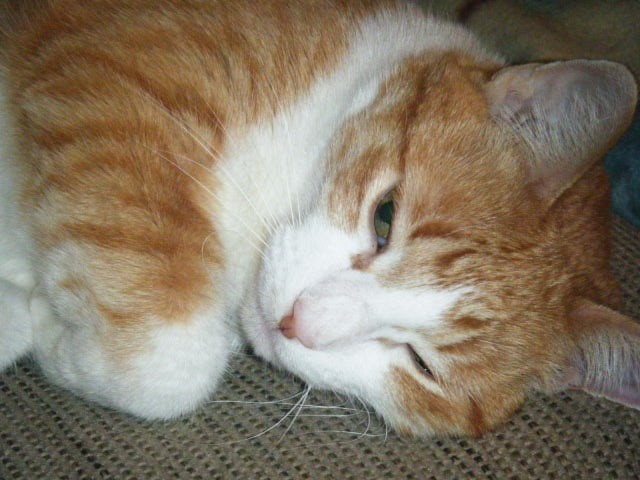 blackened area under lower jaw
Question
Daisy
My Daisy is a 12 year old short-h
blackened area under lower jaw
Question
Daisy
My Daisy is a 12 year old short-h
 my kitty Valentine
QuestionQUESTION: my kitten is 3 month old I only had h
my kitty Valentine
QuestionQUESTION: my kitten is 3 month old I only had h
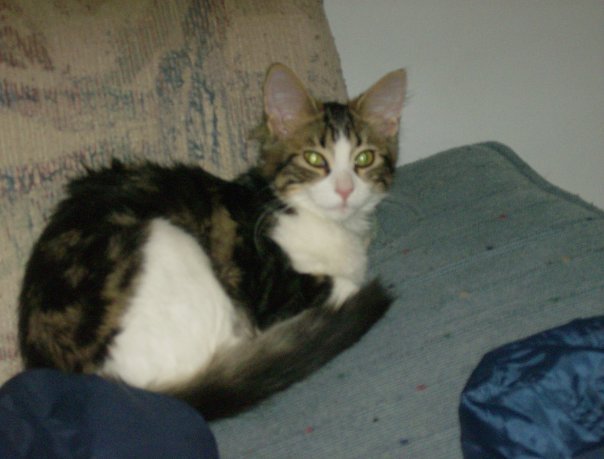 pregnat cat ??
Questionsophia
QUESTION: no one is avaible for t
pregnat cat ??
Questionsophia
QUESTION: no one is avaible for t
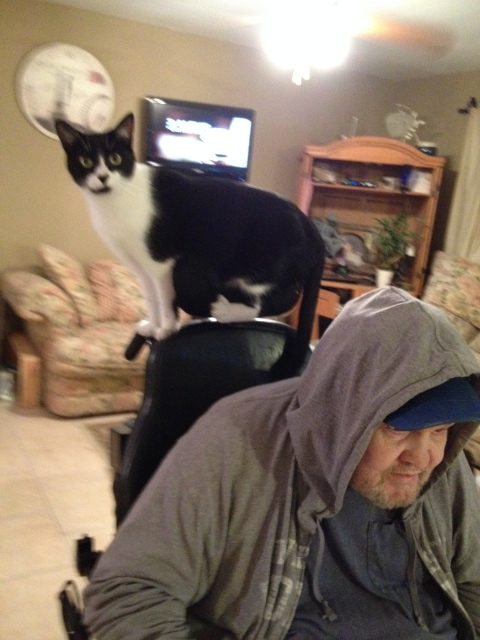 testosterone replacement for neutered male cat
Question
Monkey riding on dads Monkey sleeping h
testosterone replacement for neutered male cat
Question
Monkey riding on dads Monkey sleeping h
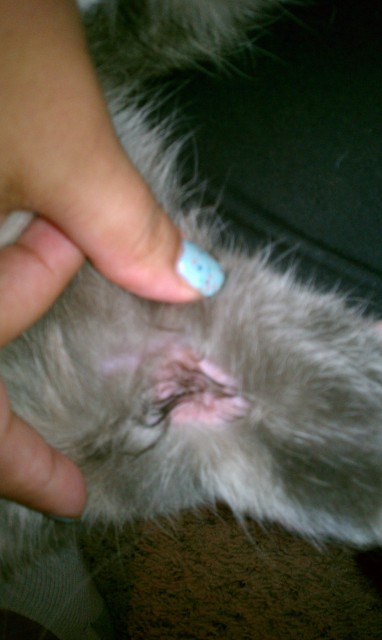 Small bald spot?
Question
Chibi arm
I was playing with my almost
Small bald spot?
Question
Chibi arm
I was playing with my almost